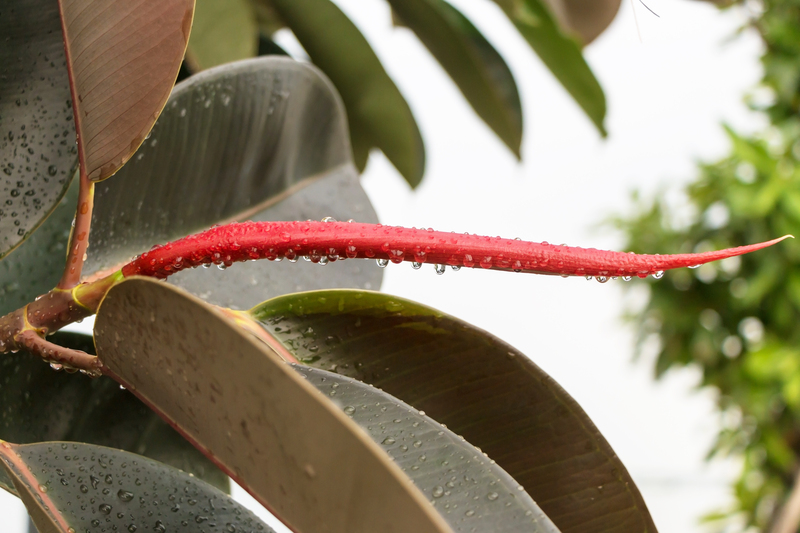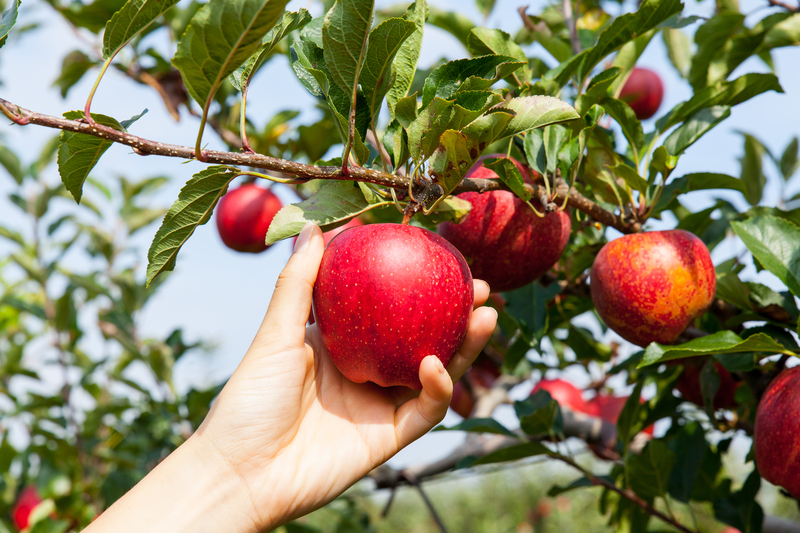Achieve Gardening Bliss with 3 Tried-and-True Weed Tips
Posted on 30/08/2025
Achieve Gardening Bliss with 3 Tried-and-True Weed Tips
Imagine stepping into your garden and seeing not a weed in sight--just thriving flowers, lush vegetables, and healthy greenery. Weed control is the cornerstone of maintaining a flourishing, blissful garden. Unsightly, persistent, and sometimes even hazardous, weeds compete with your beloved plants for resources like water, sunlight, and nutrients. Fortunately, effective gardening weed management doesn't require endless hours of backbreaking labor or harmful chemicals. Here are three time-tested, expert-approved weed tips that can help you achieve gardening nirvana.
Why Efficient Weed Control Matters to Every Gardener
Weeds are not just unsightly; they pose a real threat to your garden's overall health. Whether you maintain a flower garden, edible landscape, or a simple lawn, unwanted weeds can:
- Outcompete desired plants for essential nutrients, water, and light
- Host pests and diseases that can harm cultivated plants
- Disrupt the aesthetics of a carefully planned landscape
- Require time-consuming maintenance if not properly managed
- Reduce the productivity of fruit and vegetable gardens
By implementing a structured weed control plan, you're ensuring the health of your garden, maximizing yields, protecting biodiversity, and saving precious time. Let's unveil our top three effective weed battling strategies.

1. Mulching: Nature's Blanket for Superior Weed Suppression
What Makes Mulch So Effective Against Garden Weeds?
Mulching is a gardener's first line of defense when it comes to organic weed control. A protective layer of mulch serves many purposes, but one of its primary roles is to blanket the soil, blocking out sunlight that weed seeds need to sprout and grow.
When you add mulch for weed suppression, you'll notice:
- Dramatic reduction in weed growth--less sunlight means fewer weeds
- Improved moisture retention, leading to healthier plants
- Enhanced soil quality as organic mulch decomposes
- More time to enjoy your garden, less time weeding
Types of Mulches Suitable for Weed Prevention
- Organic Mulches: Wood chips, bark, straw, grass clippings, leaves, and compost
- Inorganic Mulches: Landscape fabric, black plastic, gravel, and pebbles
Organic mulches improve soil structure and fertility over time, while inorganic mulches are longer-lasting and require less frequent replacement.
Tried-and-True Mulching Tips for Ultimate Weed Control
- Apply a thick layer: A minimum of 2-4 inches is best to block sunlight effectively
- Replenish regularly: Organic mulches decompose and will need to be topped up each season
- Avoid piling against stems and trunks: Allow some space around plants to prevent rot or pest issues
- Smother existing weeds: Lay newspaper or cardboard beneath the mulch for even more weed suppression
Remember: The right mulch not only helps you keep weeds in check but also nurtures your garden soil, setting the stage for a blissful, weed-free patch of paradise.
2. Smart Planting: Densely Plant and Crowd Out Garden Invaders
The Power of Dense Planting for Natural Weed Prevention
Mother Nature dislikes a vacuum, and so do weeds. If you don't fill your garden beds with perennials, annuals, or ground covers, weeds will gladly take up residence. Dense planting is a natural, chemical-free way to keep weeds out by leaving them no room to grow.
Utilizing plants as living mulch means:
- Shading soil and reducing available light for seeds to germinate
- Establishing root systems that outcompete weeds for nutrients and water
- Providing a lush, full look to your garden beds and borders
How to Maximize Results with Dense Planting
- Choose fast-growing ground covers such as creeping thyme, sedum, or ajuga for low-maintenance areas
- Adjust spacing of perennials and annuals to be slightly closer than recommended--without causing overcrowding
- Stagger planting times to maintain coverage throughout the growing season
- Combine tall and low plants for a layered effect that shades out opportunistic weeds
By thoughtfully arranging your plants, you create a competitive environment where weeds can't gain a foothold. This eco-friendly solution not only boosts aesthetics but makes garden maintenance a breeze.
Top Ground Cover Plants for Effective Weed Weed Suppression
- Creeping Jenny (Lysimachia nummularia)
- Sweet Woodruff (Galium odoratum)
- Clover (Trifolium repens) - Great for lawns
- Periwinkle (Vinca minor)
- Pachysandra (Pachysandra terminalis)
Pair dense planting with mulching for a synergy that turns your beds into a nearly weed-free sanctuary. As your chosen plants thrive, they'll keep out the garden invaders before they start.
3. Timely and Targeted Weeding: Outsmarting Weeds the Smart Way
Effective Hand Weeding - When, Where, and How
Despite your best efforts with mulch and dense planting, some weeds will inevitably emerge. Manual weeding remains a gardener's tried-and-true weapon--when done correctly and consistently, it can prevent a small problem from becoming a full-blown weed invasion.
The Golden Rules of Efficient Garden Weeding
- Weed while the soil is moist: After rain or watering, roots are easier to remove intact
- Remove entire roots: Many pesky weeds regrow from fragments (think dandelions and bindweed)
- Start early and often: Young weeds are faster and easier to eliminate--they haven't gone to seed yet
- Never let weeds flower or seed: This is crucial! Preventing seed production reduces future problems
- Use the right tools: A hand fork, hoe, or specialized weeding tool saves time and effort
Innovative Weeding Tools for Effortless Results
- Hand Weeders: For precision removal around desirable plants
- Dutch Hoes: Glides just below the surface to slice off annual weeds efficiently
- Weed Pullers: Ideal for tap-rooted perennials like dandelions
Regular, targeted hand weeding ensures that stray weeds don't stand a chance to establish a stronghold and spread. Set aside a few minutes each week--your garden will thank you!
Bonus: Additional Tips for Lasting Weed Freedom in the Garden
- Solarization: Cover empty beds with clear plastic during hot periods to kill weed seeds by the sun's heat
- Edge your beds: Physical garden edges or trenching can stop grass and creeping weeds from spreading
- Regular monitoring: Walk your garden weekly with a keen eye--early action means less work
- Limit soil disturbance: Cultivation can bring buried weed seeds to the surface, so dig only when necessary
- Compost with care: Never add weeds with seeds or persistent roots to your compost bin

Common Questions About Weed Management - Expert Answers
Why can't I just rely on weed killers?
Chemical weed killers can be effective, but they come with environmental and health risks. Overuse may harm beneficial insects and pollute groundwater. Integrated, sustainable techniques--like mulching, dense planting, and manual removal--offer safer, long-term results for home gardeners.
What's the best time of day for weeding?
The best time to weed is after a rain or early in the cool morning, when soil is damp--roots slip out more easily. Try to avoid hot afternoons, which can be more labor-intensive and less effective.
How do I deal with persistent perennial weeds?
For stubborn weeds (such as bindweed, couch grass, or thistle):
- Repeat removal of as much root as possible
- Smother affected areas with cardboard and mulch
- Use dense groundcover to starve the roots of light
- For severe infestations, solarize ground during the hottest months
Conclusion: Blissful, Beautiful, and Bountiful Gardens Await
A weed-free garden isn't merely a dream--it's a reality within your reach. By applying these three proven weed busting techniques--mulching, dense planting, and timely hand removal--you'll transform ongoing garden chores into a low-maintenance, rewarding routine.
Combine and adapt these weed tips to suit your unique landscape, and you'll enjoy more blooms, bigger harvests, and the true joy of gardening. Let your yard be the blissful sanctuary you deserve--lush, vibrant, and gloriously weed-free!
More Resources for Weed-Free Gardening Success
- Want a deeper dive? Visit your local extension service or botanical garden for region-specific advice
- Check out expert books and reliable gardening websites for tools and inspiration
- Join community forums or gardening clubs for support and new ideas
Armed with these time-tested strategies, achieving gardening bliss is not just possible--but inevitable. Happy gardening!
```Latest Posts
Crafting Your Own Miniature Garden: The Container Gardening Approach
Spark Imagination with a Kid-Appropriate Garden
Navigate your first garden with 9 crucial beginner tips
Craft a Harmonious Zen Garden with Innovative Design Ideas
Weather-Wise: Ensuring Your Garden's Survival in Severe Storms

